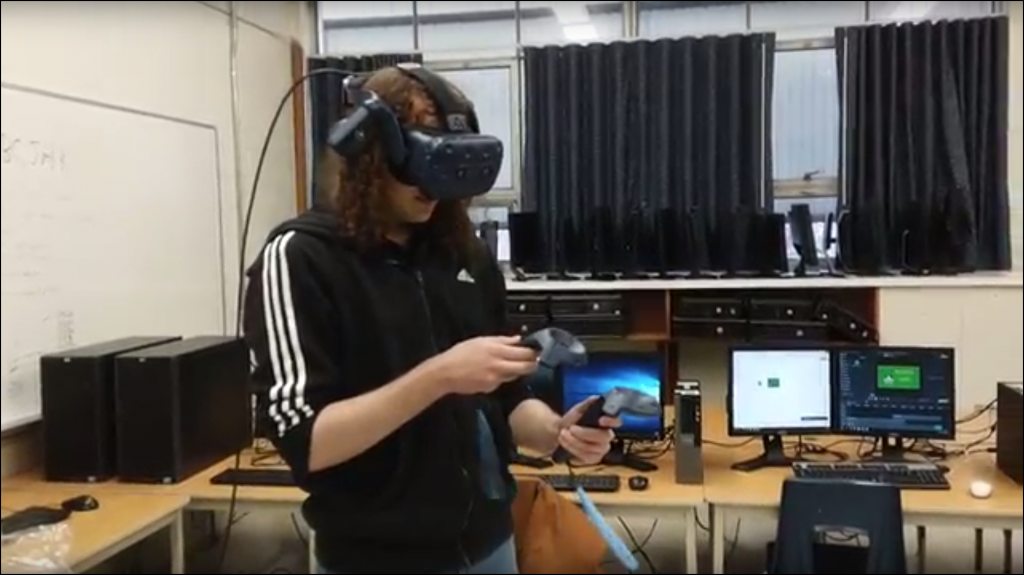Periodically I will post a “Lunch and Learn” day on the daybook, which will be used for any of the following reasons:
- for anyone falling behind in their assignments (i.e. with a mark below ~60%)
- for anyone chronically late
- for anyone who has missed a number of classes and may need extra assistance to catch up
Attendance will be mandatory for anyone asked to attend one of these sessions.
I don’t have a formal policy about late arrivals, but late arrivals will be recorded and if it becomes a recurring problem (>2 times), there will be consequences, ranging from staying behind after class to detentions.
Remember that if you arrive late you will be disrupting the class and will likely have missed important content about the day.
Just don’t be late!
(See also Lunch and Learn)
[teacher link]

Our first test of our new VR system, to be used to develop software in both my Computer Studies and Communications Technology classes. Luckily we were able to get the hardware purchased and the software installed and working just in time for the open house tonight.
The general policy for late submissions is that 5% of your achieved mark will be deducted per day to a maximum of 15% for grades 9-10 and a maximum of 25% for grades 11-12 (DSBN policy). There may be exceptions to this, depending on the specific circumstances.
If assignments are posted online and can be done from home, absence due to a school activity does not extend the deadline.
If the situation warrants that an assignment can no longer be handed in, the mark will be a zero beyond that.
(You will only be given a reasonable amount of time to submit a late assignment. Don’t expect to be handing in assignments two or three weeks after they are due!)
Each item will be marked out of four. Spelling and grammar mistakes will result in lost marks. If in doubt, get a classmate to review your work before the deadline.
Each response must be written in a way that it makes sense in its own context, i.e., as a standalone paragraph (or paragraphs) placed in a separate report away from the requirements. You will NOT be able to get away with short replies in this report!
If I add comments, please do not delete them. If necessary, duplicate the commented section and strike out the original section as shown in this example:
original part new part
To receive full marks, be sure you address the following for each response:
- the context to the subject area is clear
- the response demonstrates a clear understanding of the concept(s)
- the terminology is appropriate to the subject and skill level (grade, E vs M, etc.)
We will begin this course by acknowledging that we are meeting on aboriginal land that has been inhabited by Indigenous peoples from the beginning.
As settlers, we’re grateful for the opportunity to meet here and we thank all the generations of people who have taken care of this land – for thousands of years.
Long before today, as we gather here, there have been aboriginal peoples who have been the stewards of this place.
In particular, we acknowledge – the traditional territory of Anishinaabeg, Ojibway/Chippewa and Haudenosaunee peoples.
We recognize and deeply appreciate their historic connection to this place. We also recognize the contributions of Métis, Inuit, and other Indigenous peoples have made, both in shaping and strengthening this community in particular, and our province and country as a whole.
As settlers, this recognition of the contributions and historic importance of Indigenous peoples must also be clearly and overtly connected to our collective commitment to make the promise and the challenge of Truth and Reconciliation real in our communities, and in particular to bring justice for murdered and missing indigenous women and girls across our country.
We will begin this course by acknowledging that we are meeting on aboriginal land that has been inhabited by Indigenous peoples from the beginning.
As settlers, we’re grateful for the opportunity to meet here and we thank all the generations of people who have taken care of this land – for thousands of years.
Long before today, as we gather here, there have been aboriginal peoples who have been the stewards of this place.
In particular, we acknowledge – the traditional territory of Anishinaabeg, Ojibway/Chippewa and Haudenosaunee peoples.
We recognize and deeply appreciate their historic connection to this place. We also recognize the contributions of Métis, Inuit, and other Indigenous peoples have made, both in shaping and strengthening this community in particular, and our province and country as a whole.
As settlers, this recognition of the contributions and historic importance of Indigenous peoples must also be clearly and overtly connected to our collective commitment to make the promise and the challenge of Truth and Reconciliation real in our communities, and in particular to bring justice for murdered and missing indigenous women and girls across our country.
[Credit to https://ofl.ca/wp-content/uploads/2017.05.31-Traditional-Territory-Acknowledgement-in-Ont.pdf]
(or www.beens.org/now-serving)


You must be logged in to post a comment.